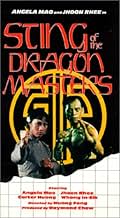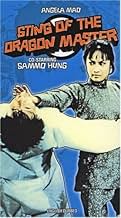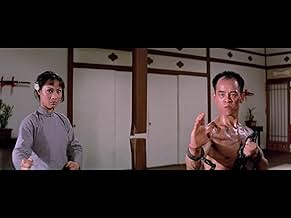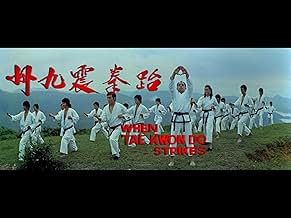Aggiungi una trama nella tua linguaDuring the Japanese occupation of Korea, the leader of a resistance movement, who's also a Taekwondo master, and his apprentices struggle against the brutal Japanese occupiers, aided by a Ch... Leggi tuttoDuring the Japanese occupation of Korea, the leader of a resistance movement, who's also a Taekwondo master, and his apprentices struggle against the brutal Japanese occupiers, aided by a Chinese female martial artist.During the Japanese occupation of Korea, the leader of a resistance movement, who's also a Taekwondo master, and his apprentices struggle against the brutal Japanese occupiers, aided by a Chinese female martial artist.
- Regia
- Sceneggiatura
- Star
Carter Wong
- Jin Zheng Zhi
- (as Carter Huang)
Recensioni in evidenza
Set in Korea, the film follows a small band of rebels who are engaged in fighting with occupying Japanese forces. Rhee stars as the leader of the resistance and, together with Chinese Hapkido expert Wan Ling-Ching (Mao), must ensure the safety of his group by seeking the help of their Chinese allies.
Angelo Mao whups some behind once again when helping a resistance leader and consequently running into some Japanese, who are the villains here, and they're painted as nasty individuals. It's a solid picture, has a strong story and some good emotions conveyed by Mao and Rhees. But it's the dazzling display of gritty "school of hard knock" action that beholds you. If you liked Hapkido, this would be up your street.
Angelo Mao whups some behind once again when helping a resistance leader and consequently running into some Japanese, who are the villains here, and they're painted as nasty individuals. It's a solid picture, has a strong story and some good emotions conveyed by Mao and Rhees. But it's the dazzling display of gritty "school of hard knock" action that beholds you. If you liked Hapkido, this would be up your street.
I first saw "When Taekwondo Strikes" over twenty years ago via a panned and scanned (and dubbed) VHS copy, and at the time I didn't think too much of it. But recently I got the opportunity to see it again this time with an anamorphic widescreen DVD edition that had the original Mandarin track and English subtitles. This better edition may explain why my feelings about the movie improved. Certainly, the movie is not perfect. It has some of the clichés associated with old school kung fu movies (chortling villains, exaggerated sound effects, etc.) There's not a terrible amount of plot, which results in some lengthy slow spots. And the Japanese villains could have been made into stronger opponents instead of being shown to be (mostly) hopeless. On the other hand, despite the largely one-sided fights, the martial arts scenes aren't too bad, having excitement and coming across as fairly believable. Angela Mao makes for a charismatic protagonist, and there's fun seeing a pre- fame Sammo Hung as one of the villains. I'm generally not a fan of old school Hong Kong marital arts movies, but I have to admit that this one was, despite its flaws, definitely above average.
"Sting of the Dragon Masters" features Jhoon Rhee in his only martial arts film role. Rhee, who is known as the 'Father of American Tae Kwon Do' and counts Muhammad Ali among his students, plays a humble, unassuming man living in Japanese-occupied Korea in the early twentieth century. He makes every effort to conceal his martial skill, but is eventually forced to lash out against the Japanese oppressors. (In this regard, and also because it is a Golden Harvest production, "...Dragon Masters" bears more than a passing resemblance to Bruce Lee's "The Chinese Connection".) Fighting alongside Rhee are chop-socky stalwarts Angela Mao Ying and Carter Wong, while the seemingly endless array of villains includes Whang Ing-Sik (dressed in a very loud kimono) and Sammo Hung. As is the case with many martial arts films, the storyline is simple and exists primarily to link the fight scenes together. But, good god, what fight scenes they are! "Sting of the Dragon Masters" offers spectacular, jaw-dropping action, with a special focus on kicks (as you might expect from a film whose alternate title is "When Tae Kwon Do Strikes"), and you'll certainly feel that you've gotten your money's worth by the time the closing credits roll.
While the film is not abundant with taekwondo philosophy or technique, it does tell a story that most American taekwondo students are unfamiliar with. That story is set in the backdrop of the Japanese occupation of Korea during World War II and the Korean resistance to that occupation. This tale of modern oppression is, simultaneously, a tale of how embedded in the fabric of the Korean culture taekwondo is. Rhee plays the leader of the underground resistance who is, of course, a taekwondo Grandmaster. Rhee is forced to reveal his identity, and risk death, in order to attempt to save the life of an imprisoned Catholic Priest.
The film's sparse dialogue is subtitled but the action is plentiful as Rhee is joined by an All Star cast of Asian action stars, including Angela Mao, Carter Wong, Sammo Hung, and many more fighters/actors. While many styles of martial arts are evident, the presence of Rhee and Anne Winton, Rhee's star pupil off the movie screen, remind us that this is, theoretically, a taekwondo action film.
As a snapshot of modern Korean history and a look at the role of Taekwondo in personal defense and the defense of a culture I do recommend this film."
Two years later, in 2018 Grandmaster Rhee would pass away and be mourned all over the world for his contributions to Taekwondo and humanity.
One of the interesting and little know facts about this film was that it was Bruce Lee who introduced his friend, Jhoon Rhee, to Golden Harvest to get the film made. In addition to Lee's friendship with Rhee he liked the fact that the story of the film involved a similar theme to Lee's own Fist of Fury. That theme was resistance to Japanese occupying forces.
The film is also known and been released as Sting of the Dragon Masters and Taekwondo Heroes.
The film's sparse dialogue is subtitled but the action is plentiful as Rhee is joined by an All Star cast of Asian action stars, including Angela Mao, Carter Wong, Sammo Hung, and many more fighters/actors. While many styles of martial arts are evident, the presence of Rhee and Anne Winton, Rhee's star pupil off the movie screen, remind us that this is, theoretically, a taekwondo action film.
As a snapshot of modern Korean history and a look at the role of Taekwondo in personal defense and the defense of a culture I do recommend this film."
Two years later, in 2018 Grandmaster Rhee would pass away and be mourned all over the world for his contributions to Taekwondo and humanity.
One of the interesting and little know facts about this film was that it was Bruce Lee who introduced his friend, Jhoon Rhee, to Golden Harvest to get the film made. In addition to Lee's friendship with Rhee he liked the fact that the story of the film involved a similar theme to Lee's own Fist of Fury. That theme was resistance to Japanese occupying forces.
The film is also known and been released as Sting of the Dragon Masters and Taekwondo Heroes.
Jhoon Rhee should have made more martial arts films as he is one of the top practioneers of his style, Tae Kwon Do. He was one of a few people who taught Bruce Lee high kicks.
Even so, this Asian movie from 1973 is a solid one. Most of the time in an Asian production, the fight sequences are speeded up and ridiculously so. "When Tae Kwon Do Strikes" is a bit different, as the choreography is executed in real time. In my opinion, this doesn't detract from the film's entertainment.
I have been watching martial arts films for about 30 years but I hadn't heard of the above film until 2 years ago. It was worth the wait though.
Lo sapevi?
- QuizBruce Lee was not in the movie "When Taekwondo Strikes," but he played a key role in getting the film made. He convinced Golden Harvest to produce the film, starring his friend Jhoon Rhee, a well-known Taekwondo instructor. Bruce Lee's involvement was primarily behind the scenes, helping to facilitate the production.
- Versioni alternativeThe UK theatrical version was heavily cut to remove the whipping of the priest, as well as substantial cuts to the fight scenes, including blows to head, kicks, chain-fighting, and a man being knocked down the stairs.
- ConnessioniFeatured in The Best of the Martial Arts Films (1990)
I più visti
Accedi per valutare e creare un elenco di titoli salvati per ottenere consigli personalizzati
Dettagli
- Tempo di esecuzione
- 1h 31min(91 min)
- Mix di suoni
- Proporzioni
- 2.35 : 1
Contribuisci a questa pagina
Suggerisci una modifica o aggiungi i contenuti mancanti

































